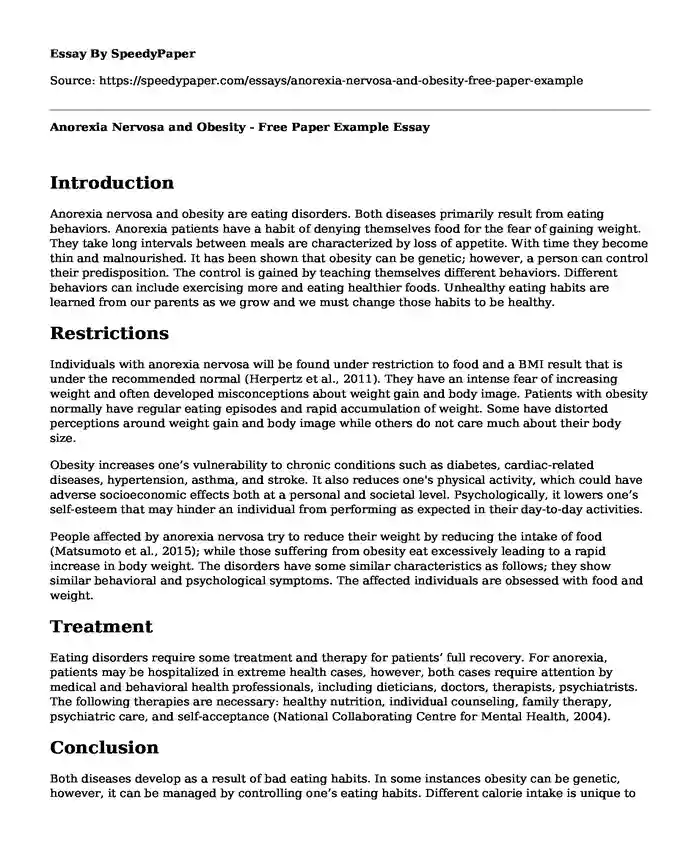
| Type of paper: | Essay |
| Categories: | Mental health Disorder |
| Pages: | 2 |
| Wordcount: | 542 words |
Introduction
Anorexia nervosa and obesity are eating disorders. Both diseases primarily result from eating behaviors. Anorexia patients have a habit of denying themselves food for the fear of gaining weight. They take long intervals between meals are characterized by loss of appetite. With time they become thin and malnourished. It has been shown that obesity can be genetic; however, a person can control their predisposition. The control is gained by teaching themselves different behaviors. Different behaviors can include exercising more and eating healthier foods. Unhealthy eating habits are learned from our parents as we grow and we must change those habits to be healthy.
Restrictions
Individuals with anorexia nervosa will be found under restriction to food and a BMI result that is under the recommended normal (Herpertz et al., 2011). They have an intense fear of increasing weight and often developed misconceptions about weight gain and body image. Patients with obesity normally have regular eating episodes and rapid accumulation of weight. Some have distorted perceptions around weight gain and body image while others do not care much about their body size.
Obesity increases one’s vulnerability to chronic conditions such as diabetes, cardiac-related diseases, hypertension, asthma, and stroke. It also reduces one's physical activity, which could have adverse socioeconomic effects both at a personal and societal level. Psychologically, it lowers one’s self-esteem that may hinder an individual from performing as expected in their day-to-day activities.
People affected by anorexia nervosa try to reduce their weight by reducing the intake of food (Matsumoto et al., 2015); while those suffering from obesity eat excessively leading to a rapid increase in body weight. The disorders have some similar characteristics as follows; they show similar behavioral and psychological symptoms. The affected individuals are obsessed with food and weight.
Treatment
Eating disorders require some treatment and therapy for patients’ full recovery. For anorexia, patients may be hospitalized in extreme health cases, however, both cases require attention by medical and behavioral health professionals, including dieticians, doctors, therapists, psychiatrists. The following therapies are necessary: healthy nutrition, individual counseling, family therapy, psychiatric care, and self-acceptance (National Collaborating Centre for Mental Health, 2004).
Conclusion
Both diseases develop as a result of bad eating habits. In some instances obesity can be genetic, however, it can be managed by controlling one’s eating habits. Different calorie intake is unique to each person's different body needs. One person may use more energy than the other, hence is burning more calories. Besides, serotonin levels and metabolic rates may differ causing differences in body calorie requirements.
References
Herpertz, S., Hagenah, U., Vocks, S., von Wietersheim, J., Cuntz, U., Zeeck, A. (2011). The diagnosis and treatment of eating disorders. Deutsches Arzteblatt International, 108(40), pp. 678–685.
https://doi.org/10.3238/arztebl.2011.0678
Matsumoto, J., Hirano, Y., Numata, N., Matzuzawa, D., Murano, S., Yokote, K., Iyo, M., Shimizu, E., & Nakazato, M. (2015). Comparison in decision-making between bulimia nervosa, anorexia nervosa, and healthy women: influence of mood status and pathological eating concerns. Journal of Eating Disorders, 3(14).
https://doi.org/10.1186/s40337-015-0050-6
National Collaborating Centre for Mental Health (UK). (2004). Eating disorders: Core interventions in the treatment and management of anorexia nervosa, bulimia nervosa, andrelated eating disorders. British Psychological Society: NICE Clinical Guidelines, 9(6).
https://www.ncbi.nlm.nih.gov/books/NBK49301/.
Cite this page
Anorexia Nervosa and Obesity - Free Paper Example. (2023, Nov 20). Retrieved from https://speedypaper.com/essays/anorexia-nervosa-and-obesity-free-paper-example
Request Removal
If you are the original author of this essay and no longer wish to have it published on the SpeedyPaper website, please click below to request its removal:
- Medical Essay Sample: VAC Vs. Wet and Dry
- Argumentative Essay Sample: Breast Milk Is Better Than Formula
- Essay Example. Nursing Theory Selected
- Essay Sample on Mental and Physical Disability
- Essay on Leonardo DiCaprio: Mild to Moderate OCD Sufferer
- Paper Example. Health Equity in a Community's Perspective
- Essay Sample on Phoenix Health and Well-Being Strategic Business Plan
Popular categories




